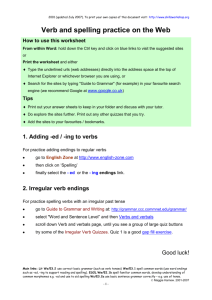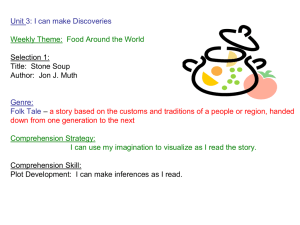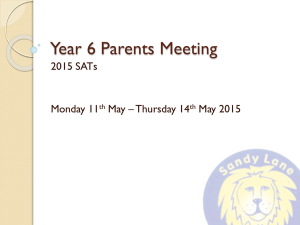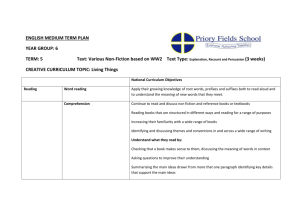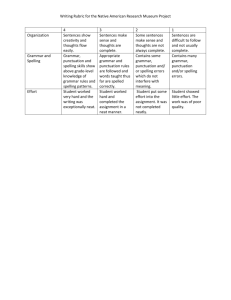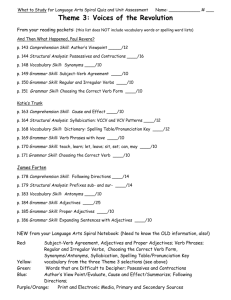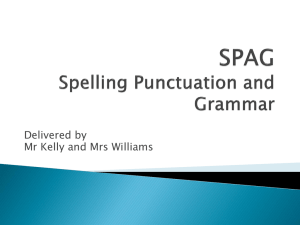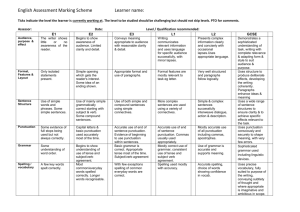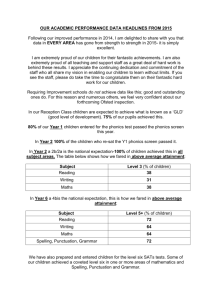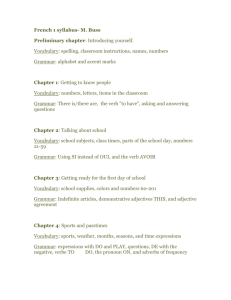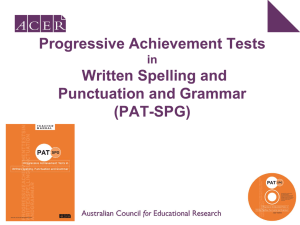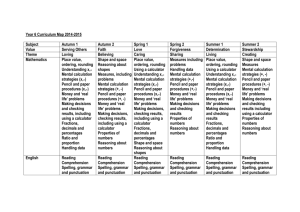English Curriculum Sound Bite Sept 2015
advertisement
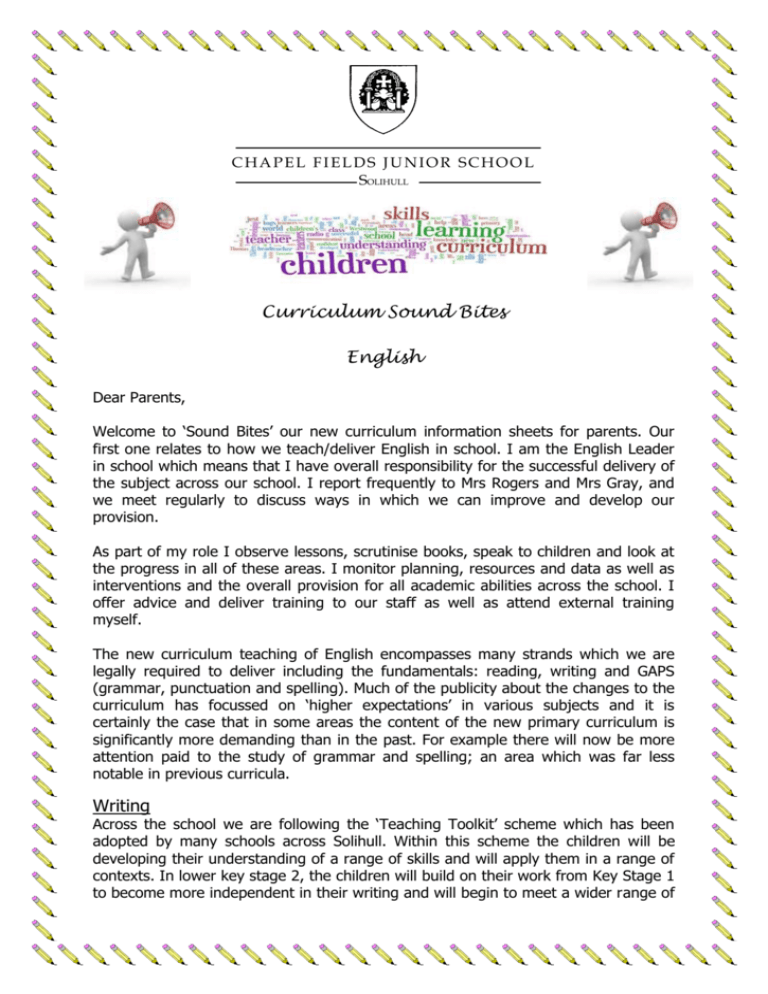
CHAPEL FIELDS JUNIOR SCHOOL SOLIHULL Curriculum Sound Bites English Dear Parents, Welcome to ‘Sound Bites’ our new curriculum information sheets for parents. Our first one relates to how we teach/deliver English in school. I am the English Leader in school which means that I have overall responsibility for the successful delivery of the subject across our school. I report frequently to Mrs Rogers and Mrs Gray, and we meet regularly to discuss ways in which we can improve and develop our provision. As part of my role I observe lessons, scrutinise books, speak to children and look at the progress in all of these areas. I monitor planning, resources and data as well as interventions and the overall provision for all academic abilities across the school. I offer advice and deliver training to our staff as well as attend external training myself. The new curriculum teaching of English encompasses many strands which we are legally required to deliver including the fundamentals: reading, writing and GAPS (grammar, punctuation and spelling). Much of the publicity about the changes to the curriculum has focussed on ‘higher expectations’ in various subjects and it is certainly the case that in some areas the content of the new primary curriculum is significantly more demanding than in the past. For example there will now be more attention paid to the study of grammar and spelling; an area which was far less notable in previous curricula. Writing Across the school we are following the ‘Teaching Toolkit’ scheme which has been adopted by many schools across Solihull. Within this scheme the children will be developing their understanding of a range of skills and will apply them in a range of contexts. In lower key stage 2, the children will build on their work from Key Stage 1 to become more independent in their writing and will begin to meet a wider range of writing contexts, including fiction, non-fiction and a range of poetry. In upper key stage 2, the children will increasingly meet a wider range of texts and types of writing, and will be encouraged to use their skills in a broader range of contexts. Across the school, children will be developing their understanding of the writing process. They will begin by studying a topic/book and focusing on language and literacy devices used. They will then build up their writing to produce a first draft. During English lessons they will learn how to edit their writing, improving focused skills, which they will then be able to apply when writing their final piece. Reading We have a new guided reading scheme in school. Guided reading sessions will take place for approximately 20 minutes each day. During these sessions five activities will run in a carousel to enable each and every child to take part in all activities during the course of the week. The activities are as follows: Pleasure reading of their own books – children will have the opportunity to read their own books, take quizzes and complete short tasks linked to their reading books Pleasure reading of topic books – children will have the opportunity to read a selection of topic books (history, geography, science or RE) and will complete short tasks linked to them. The literacy box – children will select a comprehension tasks that is suited to their ability. This will consist of a text (non-fiction, fiction or poetry), which has comprehension, language and grammar questions associated with it for them to answer. Pre-reading – children will be given a comprehension task to complete which will then be looked at in detail during the teacher led session Teacher led – Teacher will be teaching specific reading strategies and will be focusing on the comprehension task which the children completed during the pre-reading session. This scheme will enable every child to have tailored learning to meet their needs and will provide many opportunities for the children to become more independent learners. GAPS There has been a much more notable emphasis on grammar, punctuation and spelling in the new curriculum compared to previously. During English lessons, children will be taught a range of age appropriate grammar terms and punctuation which they will then be encouraged to apply to their own writing. Across the school we have adopted a new spelling initiative, and the children will be learning weekly spellings. Each year group will be learning age appropriate spellings which have been selected from the new National Curriculum requirements. During English lessons the children will be taught numerous spelling strategies to help them learn their spellings which they will then be able to use at home. Grammar Help For many parents, the grammatical terminology used in schools may not be familiar. Here are some useful reminders of some of the terms used: Present perfect tense: a tense formed using the verb ‘have’ and a participle, to indicate that an action has been completed at an unspecified time, e.g. The girl has eaten her ice-cream Fronted adverbial: a word or phrase which describes the time, place or manner of an action, which is placed at the start of the sentence, e.g. “Before breakfast,...” or “Carrying a heavy bag,...” Direct speech: words quoted directly using inverted commas, as opposed to being reported in a sentence Noun phrase: a group of words which takes the place of a single noun. Example: The big brown dog with the fluffy ears. Modal verb: a verb that indicates possibility. These are often used alongside other verbs. Example: will, may, should, can. Relative clause: a clause which adds extra information or detail. Example: The boy who was holding the golden ticket won the prize. Passive verb: a form of verb that implies an action being done to, rather than by, the subject. Example: The boy was bitten by the dog. Perfect form: a form of verb that implies that an action is completed. Example: The boy has walked home. Stay tuned for our next curriculum sound bite! Yours sincerely Miss Jordan English Leader/Year 6 Teacher
